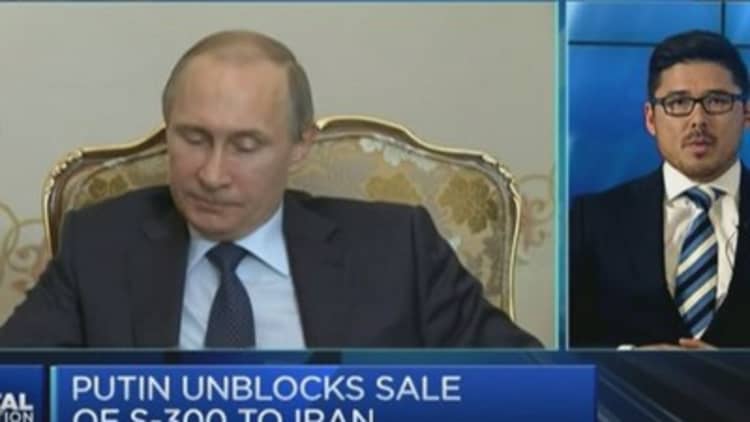
Russia took advantage of thawing international relations with Iran on Monday to resurrect its delivery of defensive weapon systems to the Middle Eastern nation.
The signing of a decree by President Vladimir Putin means that it can resume a self-imposed ban and offer S-300 anti-missile rocket systems to Iran for the first time since 2010.
Sanctions from the United Nations had originally pressured Russia into stopping deliveries, but the Kremlin's U-turn comes after world leaders came to a preliminary agreement over Iran's nuclear program.
Moscow looks to be offering itself as a trading partner to Iran as the country verges on being welcomed back onto the global stage.
However, the international nuclear talks with Iran are yet to produce a definite accord and no economic sanctions have officially been curbed. The next major deadline for the talks is June 30.
Russia will also supply grain, equipment and construction materials in exchange for crude oil from Iran, according to Reuters, which cited a senior government official.
'Advanced' air defense system
The Russian-built S-300 air missile system is a long-range weapon considered to be one of the most advanced air defense systems in the world, according to its developer, the Almaz Corporation.
It is able to shoot down aircraft and ballistic missiles within a range of 200 kilometers, but is a "defensive weapon (that) cannot serve offensive purposes," according to a statement by Russia's Foreign Minister Sergey Lavrov Monday.
Lavrov explained that the Russian government was convinced there was no longer a need for an embargo against Iran, and added that the missile sales had been put on hold "entirely voluntarily."
The timing of the announcement by Russia is crucial, according to Leonid Ivashov, a retired Russian general who heads a thinktank called the Centre for Geo-Political Analysis in Moscow. He told the RIA news agency that the move could pave the way for future contracts in Iran, according to Reuters.
"If we now delay and leave Iran waiting, then tomorrow, when sanctions are fully lifted, Washington and its allies will get Iran's large market," the news agency quoted him as saying.
US concerns
Chris Weafer, senior partner at Macro-Advisory, told CNBC that the missile sale was unlikely to jeopardize the deal with Iran. Indeed, he added that the sale could even be part of Moscow's efforts to persuade the global leaders to approve the framework deal with Iran
"It is clear that a great deal still needs to be done to secure the final deal in the summer and Moscow's access and influence in Tehran will continue to be important," he told CNBC via email.
The U.S. immediately made Moscow aware of its concerns over the sale of the S-300 system.
Secretary of State John Kerry spoke via telephone with Lavrov Monday and said that it wasn't "constructive" at this time for Russia to make such a deal, according to Marie Harf, a spokesperson for the U.S. Department of State.
"We don't think this will have an impact on unity in terms of inside the negotiating room," she told reporters at a press briefing.
Israel slammed the lifting of the ban by Russia. The country - traditionally a fierce rival of Iran's - has been firmly against the international nuclear talks. Israel sees a nuclear-armed Iran as a key threat to its security, despite Iran denying that it wants to use the uranium in weapons.
The situation has been complicated further by recent tensions in Yemen, which have managed to undermine the negotiations that Iran has made with Western nations. Many analysts have told CNBC that the violence in the Middle Eastern country is essentially a "proxy war" between Iran and Saudi Arabia.


